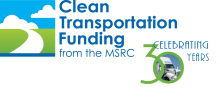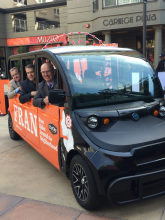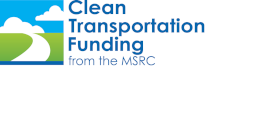
We are halfway through celebrating the MSRC’s 30 years of Clean Transportation Funding and are highlighting six more exciting programs that the MSRC has funded over the years:
- Dodger Stadium Express (multi-year)
In partnership with the 2020 World Series Champs LA Dodgers and LA Metro, the Dodger Stadium Express has provided free CNG-bus trips for fans roundtrip from Union Station to the stadium since 2010. The program gets people out of their cars and onto public transit and helps to alleviate traffic congestion and air pollution that results from cars sitting in traffic. The service has transported more than two million fans over the last decade and is beginning to resume its normal operations as fans can once again safely attend games in person.
- Transportation of Special Olympics World Games Athletes (2015)
The MSRC did its part to help the athletes and country delegates get to their competition venues in a cleaner, more efficient way. The MSRC helped fund the operation of 281 CNG buses to transport athletes, coaches, staff, families, volunteers and officials throughout the nine days of the World Games. The clean-fueled buses transported participants to the opening and closing ceremonies at the Los Angeles Memorial Coliseum, the Athlete Villages at UCLA, USC and Mount Saint Mary’s campuses where the athletes and officials were housed, and to several venues in downtown Los Angeles, Long Beach and Griffith Park, which hosted many of the sporting competitions.
- Freeway Service Patrol (multi-year)
The MSRC provided several rounds of funding for Freeway Service Patrol (FSP), an elite team of tow truck drivers patrolling the Southland’s freeways which help stranded motorists free-of-charge. The MSRC funded service on I-5, I-210, and routes in the Inland Empire. Having more FSP available to drivers means less congestion from accidents, breakdowns and rubber-necking, less wasted fuel, and less vehicle air pollution.
- Cummins Near-Zero Engines (2016)
The MSRC provided funding for the first-of-its kind “Near Zero” Heavy-Duty Natural Gas engine offered by Cummins Westport for transit buses and refuse collection trucks. What was so exciting about the ISL G Near Zero Natural Gas Engine was that the emissions levels were 90% lower than the EPA heavy-duty engine standard at the time, certified by the California Air Resources Board below the optional NOx emissions standard of 0.02 grams per brake-horsepower hour (g/bhp-hr). This meant that it offered “near zero” emission levels for ozone precursors and particulate matter criteria air pollutants. According to Cummins, this certification was equivalent to a 100% battery electric truck using electricity from a modern combined cycle natural gas power plant. Moreover, the engine could operate on renewable natural gas, making its operation even cleaner.
- Anaheim FRAN Electric Vehicle Micro-Transit Service (2019)

The MSRC partnered with the City of Anaheim to launch a free microtransit service called FRAN – Free Rides Around the Neighborhood (see photo). The City operates a fleet of all-electric Polaris GEM six-seater vehicles around the Center City area. The shared vehicles arrive on demand via FRAN’s smartphone application. The app contains points-of-interest information, and updates driving visitors in real time on where to park near FRAN pick-up spots. The MSRC helped the City invest in these electric vehicles in order to enhance clean mobility options around this typically congested area. FRAN does not follow fixed routes but rather visits several fixed stops based on riders’ pick-up and destination requests within the Center City area.
- Rideshare 2 School Program (2009)
In the fall of 2009, the MSRC partnered with TransVironmental Solutions on the “School Pool” Rideshare 2 School Program for K-12 schools, which provided parents with a new way of getting their children safely to school, while at the same time helping to reduce air pollution. Less than 15 percent of all trips to school are made by walking or bicycling, one-quarter are made on a school bus, and more than half of all children are driven to school in individual cars, the vast majority of which are a single child with a single driver. To alleviate this problem, parents in selected Riverside and Orange County schools registered for the Rideshare 2 School Program and were provided with a list matching them with other interested parents who drive a similar route to and from a designated school. Parents then made the individual ridesharing arrangements for their children with the other parents. In addition to carpooling, walking and bicycling teams were created and encouraged to participate in the program.
The next edition of the MSRC’s Clean Air Roadmap later this summer will feature six new projects celebrating the work of the MSRC over the last three decades.
